翻译资料 (11)
- 格式:doc
- 大小:22.00 KB
- 文档页数:2
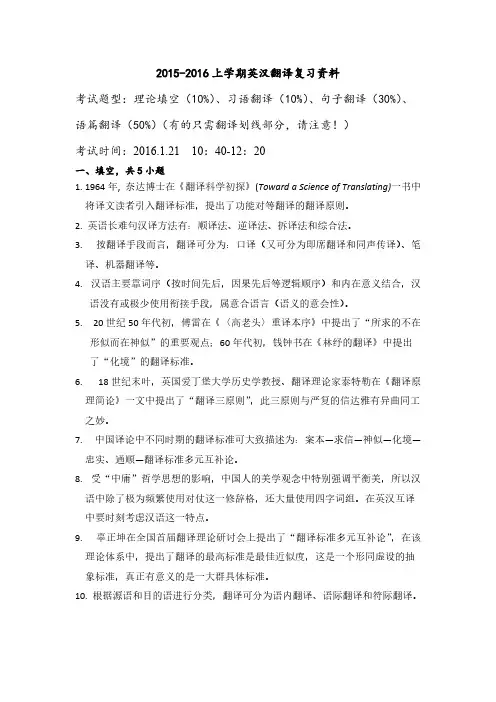
2015-2016上学期英汉翻译复习资料考试题型:理论填空(10%)、习语翻译(10%)、句子翻译(30%)、语篇翻译(50%)(有的只需翻译划线部分,请注意!)考试时间:2016.1.21 10:40-12:20一、填空,共5小题1. 1964年, 奈达博士在《翻译科学初探》(Toward a Science of Translating)一书中将译文读者引入翻译标准,提出了功能对等翻译的翻译原则。
2. 英语长难句汉译方法有:顺译法、逆译法、拆译法和综合法。
3. 按翻译手段而言,翻译可分为:口译(又可分为即席翻译和同声传译)、笔译、机器翻译等。
4. 汉语主要靠词序(按时间先后,因果先后等逻辑顺序)和内在意义结合,汉语没有或极少使用衔接手段,属意合语言(语义的意会性)。
5. 20世纪50年代初,傅雷在《〈高老头〉重译本序》中提出了“所求的不在形似而在神似”的重要观点;60年代初,钱钟书在《林纾的翻译》中提出了“化境”的翻译标准。
6.18世纪末叶,英国爱丁堡大学历史学教授、翻译理论家泰特勒在《翻译原理简论》一文中提出了“翻译三原则”,此三原则与严复的信达雅有异曲同工之妙。
7. 中国译论中不同时期的翻译标准可大致描述为:案本—求信—神似—化境—忠实、通顺—翻译标准多元互补论。
8. 受“中庸”哲学思想的影响,中国人的美学观念中特别强调平衡美,所以汉语中除了极为频繁使用对仗这一修辞格,还大量使用四字词组。
在英汉互译中要时刻考虑汉语这一特点。
9. 辜正坤在全国首届翻译理论研讨会上提出了“翻译标准多元互补论”,在该理论体系中,提出了翻译的最高标准是最佳近似度,这是一个形同虚设的抽象标准,真正有意义的是一大群具体标准。
10. 根据源语和目的语进行分类,翻译可分为语内翻译、语际翻译和符际翻译。
11. 按翻译题材,翻译可分为文学翻译、政论翻译、应用文翻译和科技翻译等。
12. 根据纽马克的观点,呼唤型文本(包括政治演说、通告、商业广告、公共宣传品、通俗作品等)属于“你”型,强调“读者层”,翻译单位为段落或篇章。
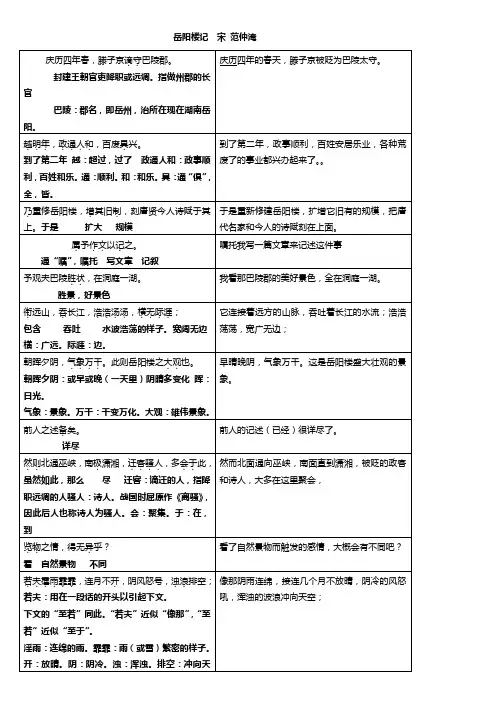
要表达的主要观点是什么? 先天下之忧而忧,后天下之乐而乐阴风怒号,浊浪排空。
“怒”以拟人的手法写出了风势之大,声音之响。
“前人之述备矣”中的“前人之述具体指什么?唐贤今人诗赋唐代诗人孟浩然的诗句“气蒸云梦泽,波撼岳阳城”,与选文第一段所描写的洞庭湖的景色、气势相近,都突出了洞庭湖的特点。
壮阔、浩渺①范仲淹□□□□□□□。
②欧阳修□□□□□□□。
①范仲淹为天下先忧后乐。
②欧阳修与吏民同醉同乐。
文中的“进”是指居庙堂之高,“退”是指处江湖之远“以物喜”___ 心旷神怡,宠辱偕忘,把酒临风,其喜洋洋者矣“以己悲”___ 去国怀乡,忧谗畏讥。
满目萧然,感极而悲者矣。
由“渔歌互答”,你能联想到《三峡》中哪两句渔歌?巴东三峡巫峡长,猿鸣三声泪沾裳找出概括“迁客骚人”“悲”、“喜”情感的语句。
悲:去国怀乡,忧谗畏讥喜:心旷神怡,宠辱偕忘“迁客骚人”情感变化的原因是和个人的遭遇外物的触发四、通假字:1、属予作文以记之:属:同“嘱”,嘱托。
2、百废具兴:具:同“俱”全,皆一、一词多义:1、属:属(zhǔ)予作文以记之(通“嘱”,嘱托)属(zhǔ)引凄异(连续)良田美池桑竹之属(shǔ,类)2、以:属予作文以记之(来)不以物喜,不以己悲(因为)3、具:百废具兴(通“俱”,全,皆)此人一一为具言所闻(详尽)4、观:此则岳阳楼之大观也(景物、景象)可远观而不可亵玩焉(观看、观赏)5、备:前人之述备矣(详尽)德才兼备(具备、具有)攻其不备(防备)关怀备至(表示完全)6、一:洞庭一湖(一个)一碧万顷(一片)长烟一空(全)一鼓作气(第一次)7、微:微斯人(没有)藐小微物(细小)8、归:吾谁与归(归依)归根结底(归结)9、薄:薄暮冥冥/日薄西山(迫近)妄自菲薄/厚此薄彼(轻视、看不起)10、国:去国怀乡,忧谗畏讥(国都)国家兴亡(国家)11、乃:乃重修岳阳楼(于是,就)问今是何世,乃不知有汉(竟然)乃悟前狼假寐(才)12、为:或异二者之为(这里指心理活动,即迁客骚人的两种览物之情)此人一一为具言所闻(替,对,表对象)13、异:或异二者之为(不同)属引凄异(怪异)渔人甚异之(对…感到诧异)14、或:或异二者之为(或许)或王命急宣(有时)或以为死(有的人)而或(有时)15、极:北通巫峡,南极潇湘(尽)感极而悲者矣(极点,极端)初极狭(很,非常)16、景:至若春和景明(日光)四时之景不同(风景)17、胜:以少胜多(胜利)予观夫巴陵胜状(美好,优美)18、通:政通人和,百废具兴(顺利)北通巫峡(通向)初极狭,才通人(通过)19、开:连月不开(放晴)开我东阁门(打开)二、理解性默写1、写迁客骚人“悲”、“喜”的句子分别是什么?答:悲“去国怀乡,忧谗畏讥;”喜“心旷神怡,宠辱偕忘。
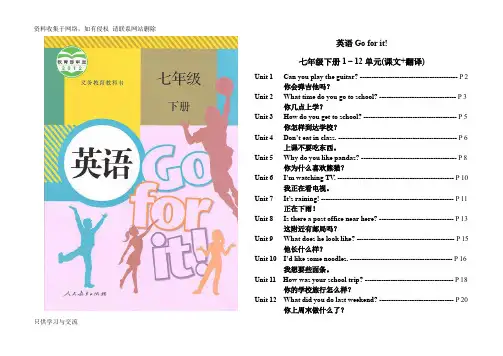
七年级下册1 – 12单元(课文+翻译)Unit 1 Can you play the guitar? ------------------------------------------ P 2你会弹吉他吗?Unit 2 What time do you go to school? --------------------------------- P 3你几点上学?Unit 3 How do you get to school? ---------------------------------------- P 5你怎样到达学校?Unit 4 Don’t eat in class. --------------------------------------------------- P 6上课不要吃东西。
Unit 5 Why do you like pandas? ----------------------------------------- P 8你为什么喜欢熊猫?Unit 6 I’m watching TV. -------------------------------------------------- P 10我正在看电视。
Unit 7 It’s raining! --------------------------------------------------------- P 11正在下雨!Unit 8 Is there a post office near here? -------------------------------- P 13这附近有邮局吗?Unit 9 What does he look like? ------------------------------------------ P 15他长什么样?Unit 10 I’d like some noodles. -------------------------------------------- P 16我想要些面条。
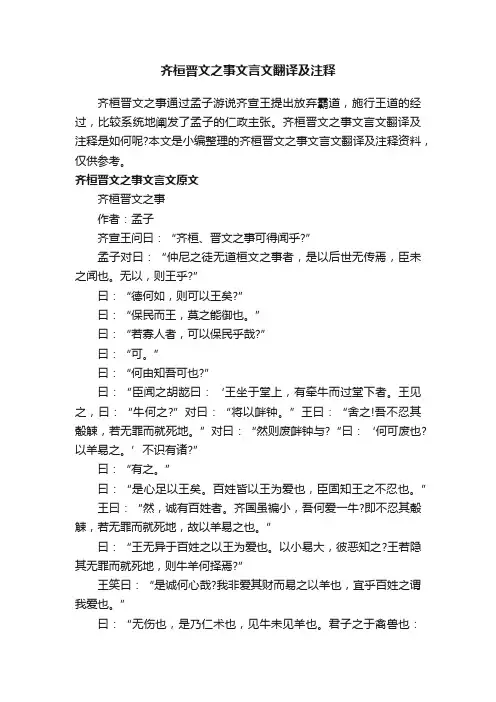
齐桓晋文之事文言文翻译及注释齐桓晋文之事通过孟子游说齐宣王提出放弃霸道,施行王道的经过,比较系统地阐发了孟子的仁政主张。
齐桓晋文之事文言文翻译及注释是如何呢?本文是小编整理的齐桓晋文之事文言文翻译及注释资料,仅供参考。
齐桓晋文之事文言文原文齐桓晋文之事作者:孟子齐宣王问曰:“齐桓、晋文之事可得闻乎?”孟子对曰:“仲尼之徒无道桓文之事者,是以后世无传焉,臣未之闻也。
无以,则王乎?”曰:“德何如,则可以王矣?”曰:“保民而王,莫之能御也。
”曰:“若寡人者,可以保民乎哉?”曰:“可。
”曰:“何由知吾可也?”曰:“臣闻之胡龁曰:‘王坐于堂上,有牵牛而过堂下者。
王见之,曰:“牛何之?”对曰:“将以衅钟。
”王曰:“舍之!吾不忍其觳觫,若无罪而就死地。
”对曰:“然则废衅钟与?“曰:‘何可废也?以羊易之。
’不识有诸?”曰:“有之。
”曰:“是心足以王矣。
百姓皆以王为爱也,臣固知王之不忍也。
”王曰:“然,诚有百姓者。
齐国虽褊小,吾何爱一牛?即不忍其觳觫,若无罪而就死地,故以羊易之也。
”曰:“王无异于百姓之以王为爱也。
以小易大,彼恶知之?王若隐其无罪而就死地,则牛羊何择焉?”王笑曰:“是诚何心哉?我非爱其财而易之以羊也,宜乎百姓之谓我爱也。
”曰:“无伤也,是乃仁术也,见牛未见羊也。
君子之于禽兽也:见其生,不忍见其死;闻其声,不忍食其肉。
是以君子远庖厨也。
”王说,曰:“诗云:‘他人有心,予忖度之。
’──夫子之谓也。
夫我乃行之,反而求之,不得吾心;夫子言之,于我心有戚戚焉。
此心之所以合于王者,何也?”曰:“有复于王者曰:‘吾力足以举百钧,而不足以举一羽;明足以察秋毫之末,而不见舆薪。
’则王许之乎?”曰:“否。
”“今恩足以及禽兽,而功不至于百姓者,独何与?然则一羽之不举,为不用力焉;舆薪之不见,为不用明焉;百姓之不见保,为不用恩焉。
故王之不王,不为也,非不能也。
”曰:“不为者与不能者之形,何以异?”曰:“挟太山以超北海,语人曰:‘我不能。
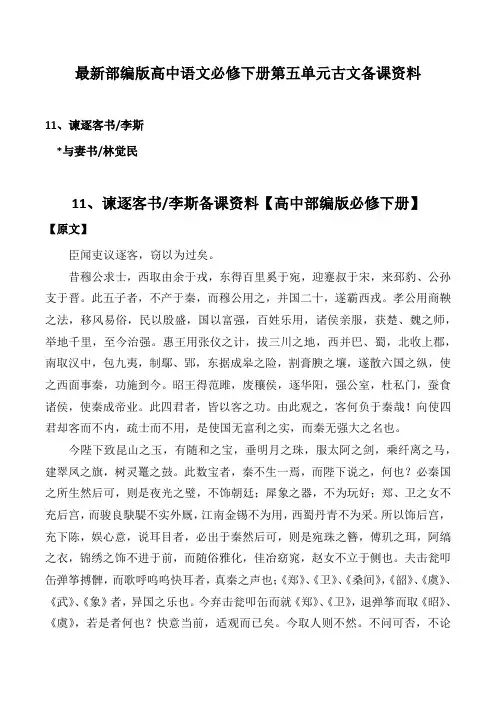
最新部编版高中语文必修下册第五单元古文备课资料11、谏逐客书/李斯*与妻书/林觉民11、谏逐客书/李斯备课资料【高中部编版必修下册】【原文】臣闻吏议逐客,窃以为过矣。
昔穆公求士,西取由余于戎,东得百里奚于宛,迎蹇叔于宋,来邳豹、公孙支于晋。
此五子者,不产于秦,而穆公用之,并国二十,遂霸西戎。
孝公用商鞅之法,移风易俗,民以殷盛,国以富强,百姓乐用,诸侯亲服,获楚、魏之师,举地千里,至今治强。
惠王用张仪之计,拔三川之地,西并巴、蜀,北收上郡,南取汉中,包九夷,制鄢、郢,东据成皋之险,割膏腴之壤,遂散六国之纵,使之西面事秦,功施到今。
昭王得范雎,废穰侯,逐华阳,强公室,杜私门,蚕食诸侯,使秦成帝业。
此四君者,皆以客之功。
由此观之,客何负于秦哉!向使四君却客而不内,疏士而不用,是使国无富利之实,而秦无强大之名也。
今陛下致昆山之玉,有随和之宝,垂明月之珠,服太阿之剑,乘纤离之马,建翠凤之旗,树灵鼍之鼓。
此数宝者,秦不生一焉,而陛下说之,何也?必秦国之所生然后可,则是夜光之璧,不饰朝廷;犀象之器,不为玩好;郑、卫之女不充后宫,而骏良駃騠不实外厩,江南金锡不为用,西蜀丹青不为采。
所以饰后宫,充下陈,娱心意,说耳目者,必出于秦然后可,则是宛珠之簪,傅玑之珥,阿缟之衣,锦绣之饰不进于前,而随俗雅化,佳冶窈窕,赵女不立于侧也。
夫击瓮叩缶弹筝搏髀,而歌呼呜呜快耳者,真秦之声也;《郑》、《卫》、《桑间》,《韶》、《虞》、《武》、《象》者,异国之乐也。
今弃击瓮叩缶而就《郑》、《卫》,退弹筝而取《昭》、《虞》,若是者何也?快意当前,适观而已矣。
今取人则不然。
不问可否,不论曲直,非秦者去,为客者逐。
然则是所重者在乎色乐珠玉,而所轻者在乎人民也。
此非所以跨海内、制诸侯之术也。
臣闻地广者粟多,国大者人众,兵强则士勇。
是以泰山不让土壤,故能成其大;河海不择细流,故能就其深;王者不却众庶,故能明其德。
是以地无四方,民无异国,四时充美,鬼神降福,此五帝三王之所以无敌也。
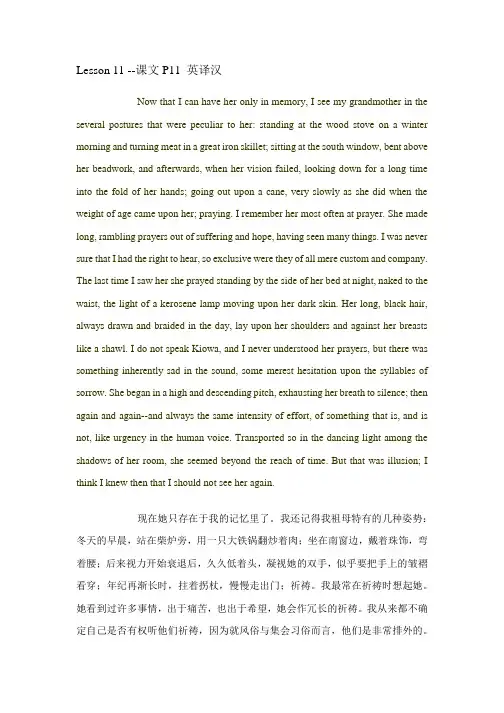
Lesson 11 --课文P11 英译汉Now that I can have her only in memory, I see my grandmother in the several postures that were peculiar to her: standing at the wood stove on a winter morning and turning meat in a great iron skillet; sitting at the south window, bent above her beadwork, and afterwards, when her vision failed, looking down for a long time into the fold of her hands; going out upon a cane, very slowly as she did when the weight of age came upon her; praying. I remember her most often at prayer. She made long, rambling prayers out of suffering and hope, having seen many things. I was never sure that I had the right to hear, so exclusive were they of all mere custom and company. The last time I saw her she prayed standing by the side of her bed at night, naked to the waist, the light of a kerosene lamp moving upon her dark skin. Her long, black hair, always drawn and braided in the day, lay upon her shoulders and against her breasts like a shawl. I do not speak Kiowa, and I never understood her prayers, but there was something inherently sad in the sound, some merest hesitation upon the syllables of sorrow. She began in a high and descending pitch, exhausting her breath to silence; then again and again--and always the same intensity of effort, of something that is, and is not, like urgency in the human voice. Transported so in the dancing light among the shadows of her room, she seemed beyond the reach of time. But that was illusion; I think I knew then that I should not see her again.现在她只存在于我的记忆里了。
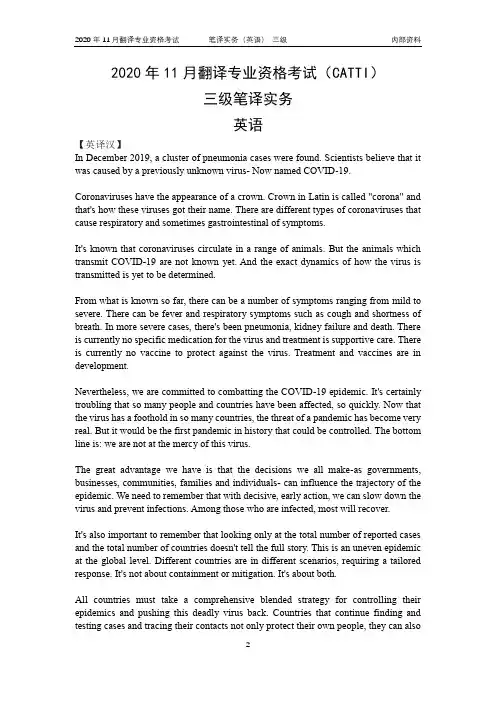
2020年11月翻译专业资格考试(CATTI)三级笔译实务英语【英译汉】In December 2019, a cluster of pneumonia cases were found. Scientists believe that it was caused by a previously unknown virus- Now named COVID-19.Coronaviruses have the appearance of a crown. Crown in Latin is called "corona" and that's how these viruses got their name. There are different types of coronaviruses that cause respiratory and sometimes gastrointestinal of symptoms.It's known that coronaviruses circulate in a range of animals. But the animals which transmit COVID-19 are not known yet. And the exact dynamics of how the virus is transmitted is yet to be determined.From what is known so far, there can be a number of symptoms ranging from mild to severe. There can be fever and respiratory symptoms such as cough and shortness of breath. In more severe cases, there's been pneumonia, kidney failure and death. There is currently no specific medication for the virus and treatment is supportive care. There is currently no vaccine to protect against the virus. Treatment and vaccines are in development.Nevertheless, we are committed to combatting the COVID-19 epidemic. It's certainly troubling that so many people and countries have been affected, so quickly. Now that the virus has a foothold in so many countries, the threat of a pandemic has become very real. But it would be the first pandemic in history that could be controlled. The bottom line is: we are not at the mercy of this virus.The great advantage we have is that the decisions we all make-as governments, businesses, communities, families and individuals- can influence the trajectory of the epidemic. We need to remember that with decisive, early action, we can slow down the virus and prevent infections. Among those who are infected, most will recover.It's also important to remember that looking only at the total number of reported cases and the total number of countries doesn't tell the full story. This is an uneven epidemic at the global level. Different countries are in different scenarios, requiring a tailored response. It's not about containment or mitigation. It's about both.All countries must take a comprehensive blended strategy for controlling their epidemics and pushing this deadly virus back. Countries that continue finding and testing cases and tracing their contacts not only protect their own people, they can alsoaffect what happens in other countries and globally. The WHO has consolidated its guidance for countries in four categories: those with no case; those with sporadic cases; those with clusters; and those with community transmission. For all countries, the aim is the same: stop transmission and prevent the spread of the virus.For the first three categories, countries must focus on finding, testing, treating and isolating individual cases and following their contacts. In areas with community spread, testing every suspected case and tracing their contacts become more challenging. Action must be taken to prevent transmission at the community level to reduce the epidemic to manageable clusters.【汉译英】水稻是世界上最主要的粮食作物之一,世界上一半以上人口(包括中国60%以上人口)都以稻米作为主食。
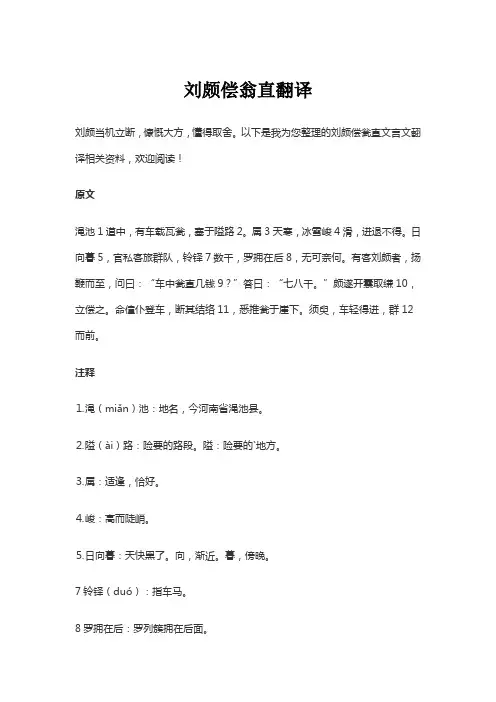
刘颇偿翁直翻译刘颇当机立断,慷慨大方,懂得取舍。
以下是我为您整理的刘颇偿瓮直文言文翻译相关资料,欢迎阅读!原文渑池1道中,有车载瓦瓮,塞于隘路2。
属3天寒,冰雪峻4滑,进退不得。
日向暮5,官私客旅群队,铃铎7数千,罗拥在后8,无可奈何。
有客刘颇者,扬鞭而至,问曰:“车中瓮直几钱9?”答曰:“七八千。
”颇遂开囊取缣10,立偿之。
命僮仆登车,断其结络11,悉推瓮于崖下。
须臾,车轻得进,群12而前。
注释⒈渑(miǎn)池:地名,今河南省渑池县。
⒉隘(ài)路:险要的路段。
隘:险要的`地方。
⒊属:适逢,恰好。
⒋峻:高而陡峭。
⒌日向暮:天快黑了。
向,渐近。
暮,傍晚。
7铃铎(duó):指车马。
8罗拥在后:罗列簇拥在后面。
9车中瓮直几钱:车里的瓮值多少钱。
直,通“值”。
瓮,一种盛水、酒的陶器,口小而腹大。
10颇遂开囊取缣(jiān):刘颇就打开口袋取出细绢。
缣,一种细绢,古时充当货币进行商品交易。
11络:缠绕,缠裹。
12噪:喧哗,很多人一起叫嚷。
13.直:同“值”,价值课外文言常用字属:1.连接。
如《三峡》中“属引凄异”。
2.恰好。
如文中“属天寒”。
3.通“嘱”。
如《岳阳楼记》中“属予作文以记之”。
4.类,等,辈。
如《桃花源记》中“有良田美池桑竹之属”。
[1]翻译渑池道中有车载着瓦瓮,堵塞在狭窄的路上。
正赶上天气寒冷,冰盖路又陡又滑,进退两难。
天色将晚,公家的和私人的旅客成群结队走来,数千车马拥挤在后面,毫无办法。
这时有一个叫刘颇的旅客,催马赶来,问道:“车上的瓮能值多少钱?”回答说:“七八千。
”刘颇立即打开包裹取出细绢,立即付了钱。
(刘颇)命令仆人上车,把缠绕的地方截断,全部将瓮推到山崖下。
不大一会儿,车载轻了,可以顺利前行,后面的车队也欢呼着前进了。
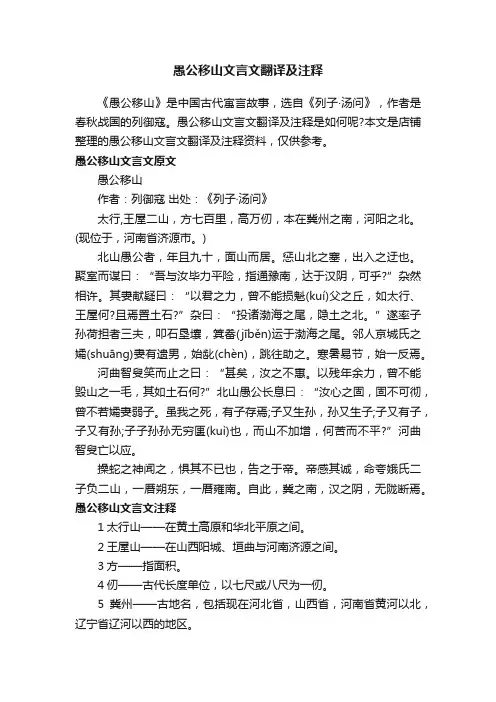
愚公移山文言文翻译及注释《愚公移山》是中国古代寓言故事,选自《列子·汤问》,作者是春秋战国的列御寇。
愚公移山文言文翻译及注释是如何呢?本文是店铺整理的愚公移山文言文翻译及注释资料,仅供参考。
愚公移山文言文原文愚公移山作者:列御寇出处:《列子·汤问》太行,王屋二山,方七百里,高万仞,本在冀州之南,河阳之北。
(现位于,河南省济源市。
)北山愚公者,年且九十,面山而居。
惩山北之塞,出入之迂也。
聚室而谋曰:“吾与汝毕力平险,指通豫南,达于汉阴,可乎?”杂然相许。
其妻献疑曰:“以君之力,曾不能损魁(kuí)父之丘,如太行、王屋何?且焉置土石?”杂曰:“投诸渤海之尾,隐土之北。
”遂率子孙荷担者三夫,叩石垦壤,箕畚(jīběn)运于渤海之尾。
邻人京城氏之孀(shuāng)妻有遗男,始龀(chèn),跳往助之。
寒暑易节,始一反焉。
河曲智叟笑而止之曰:“甚矣,汝之不惠。
以残年余力,曾不能毁山之一毛,其如土石何?”北山愚公长息曰:“汝心之固,固不可彻,曾不若孀妻弱子。
虽我之死,有子存焉;子又生孙,孙又生子;子又有子,子又有孙;子子孙孙无穷匮(kuì)也,而山不加增,何苦而不平?”河曲智叟亡以应。
操蛇之神闻之,惧其不已也,告之于帝。
帝感其诚,命夸娥氏二子负二山,一厝朔东,一厝雍南。
自此,冀之南,汉之阴,无陇断焉。
愚公移山文言文注释1太行山——在黄土高原和华北平原之间。
2王屋山——在山西阳城、垣曲与河南济源之间。
3方——指面积。
4仞——古代长度单位,以七尺或八尺为一仞。
5冀州——古地名,包括现在河北省,山西省,河南省黄河以北,辽宁省辽河以西的地区。
6河阳——黄河北岸。
山的北面和江河的南面叫做阴,山的南面和江河的北面叫做阳。
7且——副词,将近。
8面山而居——面对着山居住。
9惩(chéng)——戒,这里是‘苦于、为......所苦’的意思。
10塞(sè)——阻塞。
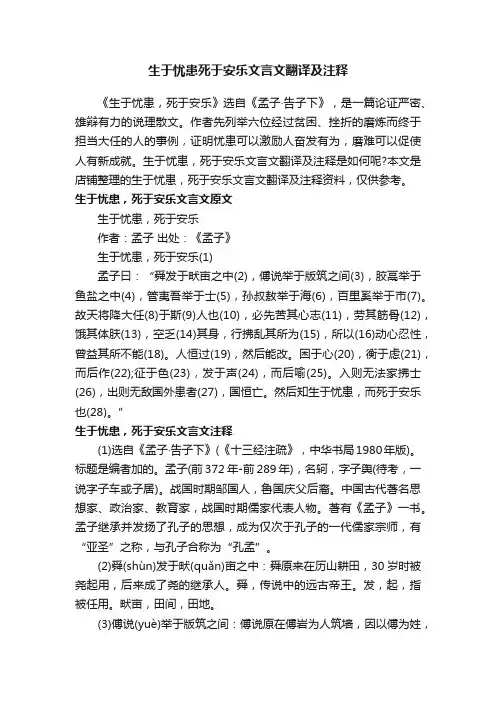
生于忧患死于安乐文言文翻译及注释《生于忧患,死于安乐》选自《孟子·告子下》,是一篇论证严密、雄辩有力的说理散文。
作者先列举六位经过贫困、挫折的磨炼而终于担当大任的人的事例,证明忧患可以激励人奋发有为,磨难可以促使人有新成就。
生于忧患,死于安乐文言文翻译及注释是如何呢?本文是店铺整理的生于忧患,死于安乐文言文翻译及注释资料,仅供参考。
生于忧患,死于安乐文言文原文生于忧患,死于安乐作者:孟子出处:《孟子》生于忧患,死于安乐(1)孟子曰:“舜发于畎亩之中(2),傅说举于版筑之间(3),胶鬲举于鱼盐之中(4),管夷吾举于士(5),孙叔敖举于海(6),百里奚举于市(7)。
故天将降大任(8)于斯(9)人也(10),必先苦其心志(11),劳其筋骨(12),饿其体肤(13),空乏(14)其身,行拂乱其所为(15),所以(16)动心忍性,曾益其所不能(18)。
人恒过(19),然后能改。
困于心(20),衡于虑(21),而后作(22);征于色(23),发于声(24),而后喻(25)。
入则无法家拂士(26),出则无敌国外患者(27),国恒亡。
然后知生于忧患,而死于安乐也(28)。
”生于忧患,死于安乐文言文注释(1)选自《孟子·告子下》(《十三经注疏》,中华书局1980年版)。
标题是编者加的。
孟子(前372年-前289年),名轲,字子舆(待考,一说字子车或子居)。
战国时期邹国人,鲁国庆父后裔。
中国古代著名思想家、政治家、教育家,战国时期儒家代表人物。
著有《孟子》一书。
孟子继承并发扬了孔子的思想,成为仅次于孔子的一代儒家宗师,有“亚圣”之称,与孔子合称为“孔孟”。
(2)舜(shùn)发于畎(quǎn)亩之中:舜原来在历山耕田,30岁时被尧起用,后来成了尧的继承人。
舜,传说中的远古帝王。
发,起,指被任用。
畎亩,田间,田地。
(3)傅说(yuè)举于版筑之间:傅说原在傅岩为人筑墙,因以傅为姓,殷王武丁用他为相。
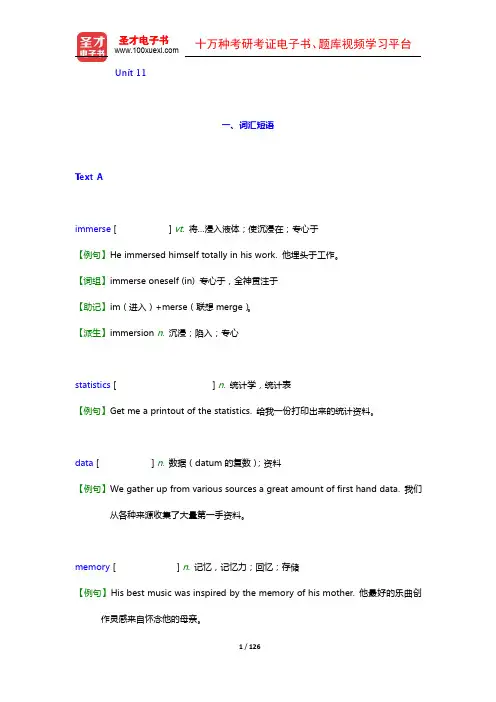
Unit11一、词汇短语Text Aimmerse[]vt.将…浸入液体;使沉浸在;专心于【例句】He immersed himself totally in his work.他埋头于工作。
【词组】immerse oneself(in)专心于,全神贯注于【助记】im(进入)+merse(联想merge)。
【派生】immersion n.沉浸;陷入;专心statistics[]n.统计学,统计表【例句】Get me a printout of the statistics.给我一份打印出来的统计资料。
data[]n.数据(datum的复数);资料【例句】We gather up from various sources a great amount of first hand data.我们从各种来源收集了大量第一手资料。
memory[]n.记忆,记忆力;回忆;存储【例句】His best music was inspired by the memory of his mother.他最好的乐曲创作灵感来自怀念他的母亲。
【搭配】in memory of纪念…cherish the memory of怀念(某人)short-term memory短期记忆,短时记忆【派生】memorial adj.记忆的;纪念的,追悼的memorial n.纪念碑,纪念馆;纪念仪式;纪念物memorize vt.记住,背熟;记忆position[]n.(可数)位置;职位;姿势;见解,立场,形势【例句】The troops took up positions along the main road.部队在主要沿线布置阵地。
【词组】be in a position to能够;有做…的机会in position就位;在适当的位置;在原位put oneself in someone’s position设身处地地为…着想【助记】pos(放)+i+tion(名词后缀)→方位,位置denote[]v.指示,表示【例句】A quick pulse often denotes fever.脉搏跳得快常表示发烧。
人教版初一英语上册翻译句子英语复习资料人教版初一英语上册Starter Unit 1~31.早上好,辛迪!2.下午好,戴尔!3.——晚上好,爱丽丝!你好吗?——我很好,谢谢你。
4.——这个用英语怎么说?——它是一件夹克衫。
5.——那是什么?——那是一个橘子。
6.请拼写它!7.你怎样拼写“地图”?8.你能拼写“你的名字”吗?9.那支笔是红色的。
10.那是一支红色的笔。
11.——这只狗是什么颜色?——它是黑色的。
Unit 11.——你叫什么名字?——我的名字是艾伦。
2.——他叫什么名字?——他的名字是迈克。
3.——她叫什么名字?——她是玛丽。
4.——他是杰克吗?——是的,他是。
(不,他不是。
)5.——你是海伦吗?——是的,我是。
(不,我不是。
)6.——很高兴见到你。
——我也很高兴见到你。
7.你的姓氏是什么?8.他的电话号码是多少?9.她的QQ号是多少?10.我的朋友是吉娜史密斯。
11.我是戴尔,并且我的电话号码是765—4348。
12.我的朋友在中国,她的名字是钟小菲。
Unit 21.这是我的朋友,简。
2.那是我的姐姐,安娜。
3.这些是我的兄弟,弗兰克和杰克。
4.那些是我的同班同学。
5.他是谁?他是我的爸爸。
6.她是谁?她是我的奶奶。
7.他们是谁?他们是我的父母。
8.那是我的家庭。
9.那个女孩是我的姐姐,海伦。
10.祝你过得愉快!11.谢谢,你也是!12.这儿有两张我的全家福。
13.我的爷爷奶奶在第一张照片里。
14.下一张照片里的是我的叔叔和阿姨。
Unit 31.这是你的铅笔吗?是的,它是。
它是我的。
2.这是他的绿色的钢笔吗?不,这不是。
蓝色的钢笔才是他的。
3.那是你的书包吗?不,那不是。
那是她的。
4.这些是你的书吗?是的,他们是。
(不,他们不是。
)5.那些是他的钥匙吗?不,它们是她的。
6.谢谢你的帮助。
——不用谢。
7.我丢了一串钥匙。
8.我必须找到它。
9.我在学校图书馆发现一些书。
10.它们是你的吗?11.请打电话685-2548找我。
英语实用翻译期末复习资料期末复习资料词组复习1. Keep away from heat 切勿受热2. Protect against cold 切勿受冻3. Keep upright 切勿倒置4. Handle with care 小心轻放5. Staff only 员工专用6. Road work ahead 前方修路7. qualified faculty 合格的师资队伍8. employment rate 就业率9. international exchanges and cooperation 国际交流与合作10. multimedia classrooms 多媒体教室11. greenhouse effect 温室效应12. noise pollution 噪音污染13. interdisciplinary studies 跨学科研究14. computational linguistics 计算机语言15. spiritual pollution 精神污染16. freezing point;ice point 冰点17. boiling point 沸点18. first aid 急救19. Eco-system 生态系统20. Eco-agriculture生态农业21. electronic form 电子表格22. online community 网上社区23. online shopping 网上购物24. like charges 同性电荷25. opposite charges 异性电荷26. Wi-fi 无线网接入27. golden week tour 黄金周游28. cuisine tour 美食游29. suburb tour 郊区游30. check in 入住酒店31. check out 离开酒店32. take-out service 外卖服务33. green hand 菜鸟34. national nature reserve 国家级自然保护区35. information counter 问询处36. duty-free shop 免税店37. non-smoking seat 非吸烟区座位38. scenic spot 风景区39. summer resort 避暑胜地40. historical sites 古迹41. natural landscape 自然风光42. Six Harmonies Pagoda 六和塔43. instant-boiled mutton 涮羊肉44. hot and sour soup 酸辣汤45. fried bread sticks 油条46. 鱼米之乡 land of milk and honey/ land of fish and rice47. 炖牛肉 stewed beef48. 红烧牛肉 braised beef with brown sauce49. Zhejiang Cuisine 浙江菜50. fried rice with eggs 蛋炒饭51. glutinous rice 糯米饭52. spring rolls 春卷53. scrambled eggs 炒蛋54. mineral water 矿泉水55. soybean milk 豆浆56. steamed dumpling 蒸饺57. 孔子 Confucius58. 武术 Wushu(Chinese martial arts)59. 五常:仁、义、理、智、信five constant virtues:benevolence,righteousness,propriety,wisdom and fidelity60. 故宫 the Imperial Palace / the Forbidden City61. 天安门 the Gate of Heavenly Peace62. 三峡 the Three Gorges on the Yangtze63. 二十四节气 the twenty-four solar terms64. 大雪 the Greater Snow65. 冬至 the Winter Solstice66. 《红楼梦》 A Dream in Red Mansions (The Story of the Stone)67. 《三国演义》The Romance of the Three Kingdoms68. 《西游记》Pilgrimage to the West; Journey to the West69. 《易经》 the Book of Changes70. 京剧 Peking Opera71. 五行 Five elements72. 春节 the Spring Festival73. 元宵节 the Lantern Festival74. Research-oriented university 研究型的大学75. 肩负重任 shoulder burdens76. repay society 回报社会77. well-known overseas scholars 知名的海外学者78. 本科生undergraduate79. 高等教育 higher education80. 多民族国家 a multi-ethnic country句子翻译1. Consumer goods are abundant of good quality and variety. 定语,句子结构。
⾼级英语(1)第三版Lesson11TheWaytoRainyMountain 翻译答案Lesson 111.政治局势的新变化使得这两个⽐较⼩的政党结成了联盟。
2.他的失败在于他的性情⽽不是能⼒。
3.我有个重要问题想和你讨论。
你能抽出半个⼩时吗?4.有很多⼈喜欢在⽹上聊天,这样他们可以免除当⾯谈话时可能遇到的尴尬。
5.这些河流再也不清澈了,河⽔的质量降低到了劣五级,连灌溉农⽥都不能⽤了。
6.⽂章虽短,但其象征性含义却很丰富,值得深⼊分析。
7.雪⼭⾼耸⼊云,其神秘的美丽⽆与伦⽐。
8.他从⼩离开家,和⽗母很少见⾯,所以在⽗亲⾯前总是有些约束。
9.这次会议⼗分重要,谁也不得⽆故缺席。
10.在她的记忆中,母亲既严厉⼜慈爱。
参考答案1.Changes in the political situation brought the two small parties into alliance.2.His failure was due to his disposition rather than his ability.3.I have something important to discuss with you. Could you spare half an hour?4.Many people prefer to chat online as this can spare them any awkwardness thatmay occur when talking face to face.5.No longer are the rivers clean and clear, and the water quality has reduced toworse than Level V, unfit even for agricultural irrigation.6.Short as it is, the article is very rich in symbolic implications which deserve athrough analysis.7.The snow mountain reached into the sky, its beauty beyond all comparison.8.He left home as a child and has seen little of his father since then. So he neverfeels at home in his father’s presence.9.As this meeting is very important, nobody should be absent without cause.10.In her memory, her mother was at once severe and kind.。
《愚公移山》原文与翻译《愚公移山》原文与翻译原文太行 , 王屋二山,方七百里,高万仞,本在冀州之南,河阳之北。
(现位于,河南省济源市。
)北山愚公者,年且九十,面山而居。
惩山北之塞,进出之迂也。
聚室而谋曰:“吾与汝毕力平险,指通豫南,达于汉阴,可乎?”杂然相许。
其妻献疑曰:“以君之力,曾不可以损魁(kuí)父之丘,如太行、王屋何?且焉置土石?”杂曰:“投诸渤海之尾,隐土之北。
”遂率后代荷担者三夫,叩石垦壤,箕畚( j īběn)运于渤海之尾。
街坊京城氏之孀( shuāng)妻有遗男,始龀( chè,n)跳往助之。
寒暑易节,始一反焉。
河曲智叟笑而止之曰:“甚矣,汝之不惠。
以残年余力,曾不可以毁山之一毛,其如土石何?”北山愚公长息曰:“汝心之固,固不行彻,曾不若孀妻弱子。
虽我之死,有子存焉;子又生孙,孙又生子;子又有子,子又有孙;子后代孙无量匮( kuì)也,而山不加增,何必而不平?”河曲智叟亡以应。
操蛇之神闻之,惧其不已也,告之于帝。
帝感其诚,命夸娥氏二子负二山,一厝朔东,一厝雍南。
自此,冀之南,汉之阴,无陇断焉。
译文:太行、王屋两座大山,周围各七百里,高七八百千丈。
原来在冀州的南部、黄河北岸的北边。
北山脚下有个叫愚公的人,年龄快要九十岁了,面对着山居住。
愚公苦于山北面道路堵塞,进进出出波折绕远。
于是愚公便招集全家人来商议说:“我和你们尽全力铲平陡峭的大山,使它向来通到豫州南部,抵达汉水南岸,好吗?”大家纷繁表示赞成他的建议。
愚公的老婆提出疑问说:“凭你的力量,连魁父这座小丘都铲平不了,又能把太行、王屋这两座山怎么样呢?何况把土石放到哪里去呢?”大家纷繁说:“把土石扔到渤海的边上,隐土的北面。
”愚公于是带领儿后代子和能挑担子的三个人,凿石挖土,用箕畚装土石运到渤海的边上。
街坊姓京城的寡妇只有一个儿子,刚七八岁,但却蹦蹦跳跳地去帮助他们。
冬夏换季,才来回一次。
河曲的智叟笑着阻挡愚公说:“你真是太不聪了然。
《江天一传》阅读答案及翻译江天一传江天一,字文石,徽州歙县人(1)。
少丧父,事其母及抚弟天表,具有至性(2)。
尝语人曰(3):“士不立品者(4)必无文章。
”前明崇祯间,县令傅岩奇其才(5),每试辄拔置第一(6)。
年三十六,始得诸生(7)。
家贫屋败(8),躬畚土筑垣以居(9)。
覆瓦不完,盛暑则暴酷日中(10)。
雨至,淋漓蛇伏(11),或张敝盖自蔽(12)。
家人且怨且叹,而天一挟书吟诵自若也(13)。
注释:(1)徽州:清代徽州府,辖歙(shè)县、休宁、祁门、绩溪等六县,府治在歙县。
(2)具:通“俱”。
至性:善良天性,指孝顺父母、友爱兄弟。
(3)尝:曾经。
语:对??说。
(4)立品:树立良好品德。
(5)傅岩:字野清,浙江义乌人,崇祯(1628—1644)初年进士,授歙县令,官至监察御史。
(6)试:指童生岁试。
(7)补诸生:考取秀才,成为县学生员。
(8)败:破、坏。
(9)躬畚(b ěn本)土筑垣:亲自取土筑墙。
畚,竹制或木制撮土工具。
此作动词用。
(10)暴(pù铺):通“曝”,晒。
(11)蛇伏:像蛇一样蜷伏着。
(12)敝盖:破伞。
(13)自若:自如,像平常一样。
译文江天一,字文石,徽州歙县人。
小时候就死了父亲,侍奉他的母亲,和抚养弟弟天表,有着纯厚的本性。
他曾经对别人说:“一个读书人,不树立好的道德品行,就必然没有好文章。
”前朝明末崇祯年间,歙县县令傅岩认为他才学奇异,每次县里童生的岁试,总是选拔他为第一名。
但到三十六岁,才补上一名生员。
他家里很穷,房屋残破不堪,就自己动手用畚箕挑土筑墙而住。
屋上盖的瓦片不齐全,大热天就暴晒在酷热的太阳中;下雨天,全身被雨淋得像蛇一样蜷伏着,有时张起破伞来遮挡一下。
家里的人一面埋怨,一面叹息,然而天一却捧着书本,朗读,和平常一样。
十三年后,魏国和赵国联合攻打韩国,韩国向齐国告急。
齐王派田忌率领军队前去救援,径直进军大梁。
魏将庞涓听到这个消息,率师撤离韩国回魏,而齐军已经越过边界向西挺进了。
CQI-11 Special Process: Plating System Assessment 特殊过程:电镀系统评估(第二版)2012年2月发布关于AIAGAIAG被公认为全球性的汽车工业协会,集合汽车OEM和供应商的力量,共同提出并解决影响全球汽车供应链的问题。
AIAG的目标和愿景是:通过整个供应链的协同与合作,降低成本,简化流程,改善产品质量,改善员工健康、安全状况、改善环境并缩短产品上市的速度。
CQI-11第2版的变化特殊过程:电镀系统评估,第2版包含新的要求,变更后的要求以及有关供应商组织需要考虑做自我评估的说明。
下面是第2版重要变化的摘要。
1. 增加四个新的过程表:•表F电解抛光和闪镀铬•表G镀硬铬•表H化学镀镍•表I除氢脆烘烤过程2. 第6部分:己增加“硬铬设备”。
3. 以下部分包含最重要的更新或变动:•封面页:增加以下总结项目:“不符合最低要求的过程表项目数量:”•第1部分:特殊过程:电镀过程评估(工厂概要)问题1.9 是否保持记录并可查取?所有过程控制和测试记录必须保持从产生记录的年度起,再加一个日历年。
•第3部分锌/锌合金电镀设备问题3.8 是否有烘干系统?电镀厂必须有确定的烘干过程以充分烘干零件,过程包括对温度和时间的控制和验证。
•第4部分装饰电镀设备问题4.7 所有热电偶/温度计都检查/更换了吗?电镀厂应该有文件化预防性的维修保养系统,并被实施,包括热电偶/温度计。
•第7部分作业审查:增加的新要求包括:7.8.8 要求:硬度7.8.9 要求:平滑度,Rz/Ra7.8.10 要求:抛光/磨光7.8.11 要求:应力7.8.12 要求:延展性7.8.13 要求:微孔数量/活性部位7.8.14 用箔片测硫含量7.8.15 拉伸试验•过程表:多数过程表中包含星号(*),用以指示经证明的偏离要求的变差是允许的。
•过程表A;B;C;D;E:有几处变动,包括但不限于“监控频次”栏。
2010下第3周翻译练习(S) 请将下面三篇短文译成中文: 1.
In some societies people want children for what might be called familial reasons: to extend the family line or the family name, to propitiate the ancestors; to enable the proper functioning of religious rituals involving the family. Such reasons may seem thin in the modern, secularized society but they have been and are powerful indeed in other places. In addition, one class of family reasons shares a border with the following category, namely, having children in order to maintain or improve a marriage: to hold the husband or occupy the wife; to repair or rejuvenate the marriage; to increase the number of children on the assumption that family happiness lies that way. The point is underlined by its converse: in some societies the failure to bear children (or males) is a threat to the marriage and a ready cause for divorce. Beyond all that is the profound significance of children to the very institution of the family itself. To many people, husband and wife alone do not seem a proper family -they need children to enrich the circle, to validate its family character, to gather the redemptive influence of offspring. Children need the family, but the family seems also to need children, as the social institution uniquely available, at least in principle, for security, comfort, assurance, and direction in a changing, often hostile, world. To most people, such a home base, in the literal sense, needs more than one person for sustenance and in generational extension.
2. In a modern society, everyone uses advertising in one way or another. A person may obtain a job by answering a classified ad. He may decide to join an organization whose advertisements express ideas that appeal to him. In choosing food products and other items of daily living, he is usually guided or influenced by advertising. Advertisements may also influence his choice of a vacation spot, restaurant, or recreational activity. Product advertising is closely related to selling and, in most cases, is part of an overall selling program. No matter how good a company’s product or service is, it will not sell well if no one knows about it. Advertising is the best method business firms have of telling large numbers of people about what they have to sell. One TV commercial may be seen by as many as 100,000,000 people. One magazine ad may be read by 35,000,000 people. Advertising is especially important in selling new products and services. It also keeps products and services selling by reminding buyers that they are available. The purpose of advertising is to sell goods and services. But advertising is also a source of consumer information. Through advertising you can learn what products are available, where to buy them, and how much they cost. Sometimes you can learn the features of different brands of a product through advertisements. You may even learn about ways of using and caring for products. Advertising brings information to the public for the purpose of selling not only products and services but also ideas or events. This information is transmitted by means of the printed word or over the air. It may be presented as a simple statement of fact, or, as is more frequently the case, it may be offered in colorful or even emotional language. Because the purpose of advertising is to influence or persuade, you must weigh carefully information you get from ads. 3. When I saw her first there was a smoke of mist about her as high as her foreyard. Her topsails and flying kites had a faint glow upon them where the dawn caught them. Then the mist rolled away from her, so that we could see her hull and the glimmer of the red sidelight as it was hoisted inboard. She was rolling slightly, tracing an Arc against the heaven, and as I watched her the glow upon her deepened, till every sail she wore burned rosily like an opal turned to the sun, like a fiery jewel. She was radiant; she was of an immortal beauty, that swaying, delicate clipper. Coming as she came, out of the mist into the dawn, she was like a spirit, like an intellectual presence. Her hull glowed, her rails glowed; there was color upon the boats and tacking. She was a lofty ship (with skysails and royal staysails), and it was alive with her, blushing in the sun, swaying and curveting. She was alive with a more than mortal life. One thought that she would that speak in some strange language or break out into a music which would express the sea and that great flower in the sky. She came trembling down to us, rising up high and plunging; showing the red below her waterline; then diving down till the smother bubbled over her hawseholes. She bowed and curveted; the light caught the skylights on the poop; she gleamed and sparkled; she shook the sea from her as she rose. There was no man aboard of us but was filled with the beauty of that ship. I think they would have cheered her had she been a little nearer to us; but, as it was, we ran up our flags in answer to her, adding our position and comparing our chronometers, then dipping our ensigns and standing away. For some minutes I watched her, as I made up the flags before putting them back in their cupboard. The old mate limped up to me, and spat, and swore. “That’s one of the beautiful sights of the world,” he said. “That was a cornfield, and a woman with her child. It’s beauty and strength. How would you like to have one of them skysails round your neck?” I gave him some answer, and continued to watch her, till the beauty, precise hull, with all its lovely detail, had become blurred to leeward, where the sun was now marching in triumph, the helm of a golden warrior plumed in cirrus.